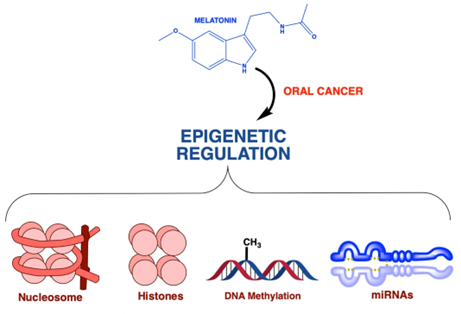Potential of melatonin to reverse epigenetic aberrations in oral cancer
new findings
DOI:
https://doi.org/10.17179/excli2023-6624Keywords:
melatonin, oral cancer, epigenetic, gene expression, microRNAs, adjuvant therapyAbstract
It is now an accepted principle that epigenetic alterations cause cellular dyshomeostasis and functional changes, both of which are essential for the initiation and completion of the tumor cycle. Oral carcinogenesis is no exception in this regard, as most of the tumors in the different subsites of the oral cavity arise from the cross-reaction between (epi)genetic inheritance and the huge challenge of environmental stressors. Currently, the biochemical machinery is put at the service of the tumor program, halting the cell cycle, triggering uncontrolled proliferation, driving angiogenesis and resistance to apoptosis, until the archetypes of the tumor phenotype are reached. Melatonin has the ability to dynamically affect the epigenetic code. It has become accepted that melatonin can reverse (epi)genetic aberrations present in oral and other cancers, suggesting the possibility of enhancing the oncostatic capacity of standard multimodal treatments by incorporating this indolamine as an adjuvant. First steps in this direction confirm the potential of melatonin as a countermeasure to mitigate the detrimental side effects of conventional first-line radiochemotherapy. This single effect could produce synergies of extraordinary clinical importance, allowing doses to be increased and treatments not to be interrupted, ultimately improving patients’ quality of life and prognosis. Motivated by the urgency of improving the medical management of oral cancer, many authors advocate moving from in vitro and preclinical research, where the bulk of melatonin cancer research is concentrated, to systematic randomized clinical trials on large cohorts. Recognizing the challenge to improve the clinical management of cancer, our motivation is to encourage comprehensive and robust research to reveal the clinical potential of melatonin in oral cancer control. To improve the outcome and quality of life of patients with oral cancer, here we provide the latest evidence of the oncolytic activity that melatonin can achieve by manipulating epigenetic patterns in oronasopharyngeal tissue.

Downloads
Published
How to Cite
License
Copyright (c) 2023 Emilio Gil-Martín, Eva Ramos, Francisco López-Muñoz, Javier Egea, Alejandro Romero

This work is licensed under a Creative Commons Attribution 4.0 International License.
Authors who publish in this journal agree to the following terms:
- The authors keep the copyright and grant the journal the right of first publication under the terms of the Creative Commons Attribution license, CC BY 4.0. This licencse permits unrestricted use, distribution and reproduction in any medium, provided that the original work is properly cited.
- The use of general descriptive names, trade names, trademarks, and so forth in this publication, even if not specifically identified, does not imply that these names are not protected by the relevant laws and regulations.
- Because the advice and information in this journal are believed to be true and accurate at the time of publication, neither the authors, the editors, nor the publisher accept any legal responsibility for any errors or omissions presented in the publication. The publisher makes no guarantee, express or implied, with respect to the material contained herein.
- The authors can enter into additional contracts for the non-exclusive distribution of the journal's published version by citing the initial publication in this journal (e.g. publishing in an institutional repository or in a book).





